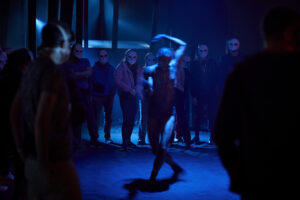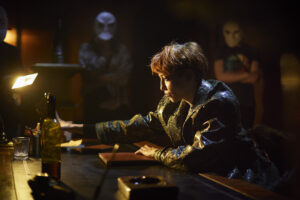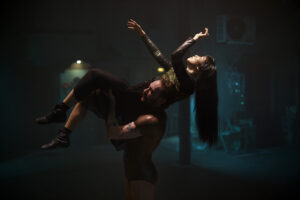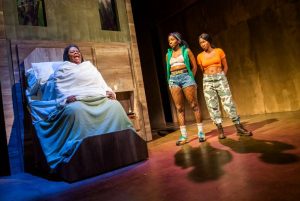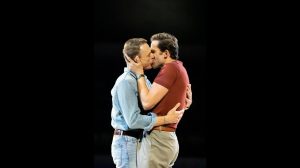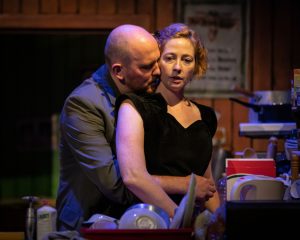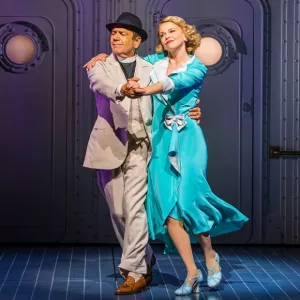Chichester’s magnificent Crazy For You gets a London transfer but how does it compare to Anything Goes?
★★★★★
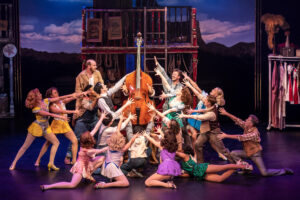
Crazy For You at Chichester Festival Theatre is a faultless production. Just like Anything Goes, another song-and-dance Broadway musical that also originated in the 1930s, it is a joyous, jaw-dropping spectacle with some of the best songs ever written and the best dancing you will ever see.
Charlie Stemp who has already impressed in Half A Sixpence, Mary Poppins and more is here stretched – literally – into twists and leaps and other astounding physical feats. He is not only athletic, his dancing conveys emotion and is beautiful to watch.
It’s interesting to compare and contrast Crazy For You with its rival, both in the 1930s and now, Anything Goes.
Crazy For You was created in 1992 but based on a 1930 musical called Girl Crazy by George and Ira Gershwin. Cole Porter’s Anything Goes followed in its 1934. This was the first golden age of the Broadway musical. The modern musical, in which a serious plot and deep characters drive the show, was still a decade away. It was the time not only of the Gershwins and Cole Porter but of Irving Berlin, Jerome Kern and Rodgers and Hart. The Jazz Age was at its peak. Light-hearted song and dance with a romantic plot were the order of the day.
Both musicals were revived in the late 20th century as Broadway made something of a comeback after the invasion of weighty British musicals. The sheer escapism of both musicals, and their predecessor 42nd Street, was just what audiences were yearning for. While the 1987 return of Anything Goes left it largely intact, with a few song changes and a rewriting of the plot, the 1992 revival of Girl Crazy, now called Crazy For You, involved a root and branch reappraisal. The plot was substantially altered, many of the original songs were excised and loads of additional Gershwin songs introduced. The result was, and is, a triumph for the book writer Ken Ludwig, director the late Mike Okrent and choreographer Susan Stroman.
The Plots are fun
So, what about those plots? Well, they’re both simple fun. Anything Goes features a romance aboard an ocean-going liner, Crazy For You is a romance taking place in a run-down theatre in Nevada. Both involve bumps on the road to love and, of course, disguises. Here, I think, Crazy For You has the edge, for a plot that is a little more coherent and more muscular, by which I mean Anything Goes is almost too frothy.
The Music is divine
So, dare we compare the music? I think this is going to be a matter of taste. I love Cole Porter’s work. It’s such a perfect marriage of music and lyric. The melodies seem effortlessly elegant. The words always clever and witty. But sometimes this elegance and wit makes them seem removed from real life. His greatest love songs are up there with the best in the Great Amercian Songbook- Night And Day and Ev’ry Time We Say Goodbye (‘There’s no love song finer, but how strange the change from major to minor’)- but they’re not included in Anything Goes which nevertheless has some of the cleverest songs ever written (‘Good authors too who once knew better words / Now only use four-letter words / Writing prose / Anything goes’).
In my opinion, George Gershwin was the finest popular composer of his day and Ira Gershwin is a contender for the finest lyricist (although I might award that title to Lorenz Hart). Ira has a way of finding the unexpected rhyme. Take Someone To Watch Over Me: ‘I’d like to add his initial to my monogram
Tell me, where is the shepherd for this lost lamb?’ or the internal rhyme in Embraceable You: ‘I love all the many charms about you
Above all, I want these arms about you’. Fabulous.
It’s very hard but I have to choose the Gershwins for that extra feel of real emotion. And in Crazy For You, you get almost the best of the Gershwins, with Shall We Dance?, I Got Rhythm and possibly my all time favourite love song They Can’t Take That Away from Me all thrown in. The new orchestrations by Doug Besterman display a masterful lightness of touch, by the way.
The productions are extraordinary
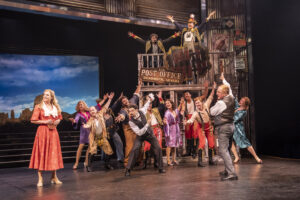
So what about these two revivals of the revivals? Anything Goes undoubtedly scores on its set, with a huge ship occupying the back of the stage. Chichester’s thrust stage makes large sets impossible, so, although the great Broadway designer Beowulf Boritt’s sparkling curtain representing a Broadway theatre sent a tingle down my spine when the lights went up, and his trucks showing the exteriors of a Nevada hotel and theatre are effective, the Chichester production of Crazy For You never feels as lavish as you might hope for a major musical. Anything Goes also features a cast about twice the size of the pretty big Chichester ensemble.
The Performers are outstanding
The current production of Anything Goes at the Barbican in London, originally starred Sutton Foster and Robert Lindsay, and now features the equally enjoyable Kerry Ellis and Denys Lawson. The co-lead is a comic gangster and not, as might have been the case in previous productions, Miss Ellis’s romantic interest. Crazy For You features Charlie Stemp and Carly Anderson as the two lovers, Boby and Polly.
Both musicals are well led and offer a talented cast in depth. In Crazy for You’s 26 strong cast, it’s difficult to pick out individuals but I must mention Tom Edden as Bela Zangler, the exasperated producer, and who extracted maximum laughs. The mirror scene in which he and Charlie Stemp match each other’s actions is hilarious. Meryl Ansah is Bobby’s desperate, dominant would-be fiancée who gets to sing the delightful Naughty Baby. Gay Soper is Bobby’s imperious mother, and Matthew Craig is Lank, Bobby’s threatening but ultimately comical rival in love.
The performers in both productions sing well. Kerry Ellis is possibly the finest singer of the bunch, but I did love Carly Anderson’s moving versions of Embraceable You and Someone To Watch Over me.
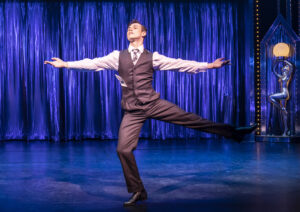
As for the dancing, of course they are all great. The chorus line tap dancing in Anything Goes, led by Miss Ellis, is eye-popping. But, when it comes to individual dancing, Charlie Stemp is in a different class to the others. Superlatives fail when it comes to his ability to spin and jump over and over again. He combines this athleticism with beauty and emotional truth. Crazy for You is worth the ticket price just to see him. He’s also nice looking and sings and acts well.
The Directors are geniuses
Both musicals have a combined choreographer and director. The great Kathleen Marshall brings her skills to Anything Goes and the result is very slick and impressive, especially in the chorus work. Susan Stroman, who choreographed the original 1992 Crazy For You, now directs as well. I left feeling I’d like her choreograph every musical I see from now on. There is so much invention in the solo, duet and chorus numbers.
I have one reservation about Crazy For You. Act one ends in an overwhelming routine for I Got Rhythm. It builds and it builds, and just when you think it can’t build any more, it does. A standing ovation halfway through a show is a rare thing. But it also happens in Anything Goes, when the title song is given a similarly exhausting work out. You think, how can they follow this? Well, Anything Goes does with Blow Gabriel Blow, and a big ending. Crazy for You continues to excite with brilliant song and dance but never again hits the height of I Got Rhythm. The end is more of a walk down than a finale. Then again, that soaring final line of ‘Who Could Ask For Anything More’ did bring the audience to its feet once again.
I’d love to see both these shows again but if I was offered tickets for them both right now, which would I choose? At the end of last year, I said Anything Goes with Sutton Foster had given me my best night in a theatre since they reopened. But, right now, I would choose the exuberant Crazy For You at Chichester Festival Theatre starring Charlie Stemp.
Crazy For You ran at Chichester Festival Theatre until 4 September 2022. It will transfer to the Gillian Lynne Theatre in London’s West End from 24 June 2023 to 20 January 2024
Paul was given a press ticket by the producers.
Click here to watch this review on the One Minute Theatre Reviews YouTube channel.



